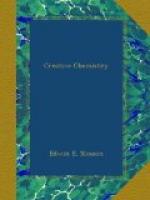The problem of food is a chemical problem. Whenever energy can be obtained economically we can begin to make all kinds of aliment, with carbon borrowed from carbonic acid, hydrogen taken from the water and oxygen and nitrogen drawn from the air.... The day will come when each person will carry for his nourishment his little nitrogenous tablet, his pat of fatty matter, his package of starch or sugar, his vial of aromatic spices suited to his personal taste; all manufactured economically and in unlimited quantities; all independent of irregular seasons, drought and rain, of the heat that withers the plant and of the frost that blights the fruit; all free from pathogenic microbes, the origin of epidemics and the enemies of human life. On that day chemistry will have accomplished a world-wide revolution that cannot be estimated. There will no longer be hills covered with vineyards and fields filled with cattle. Man will gain in gentleness and morality because he will cease to live by the carnage and destruction of living creatures.... The earth will be covered with grass, flowers and woods and in it the human race will dwell in the abundance and joy of the legendary age of gold—provided that a spiritual chemistry has been discovered that changes the nature of man as profoundly as our chemistry transforms material nature.
But this is looking so far into the future that we can trust no man’s eyesight, not even Berthelot’s. There is apparently no impossibility about the manufacture of synthetic food, but at present there is no apparent probability of it. There is no likelihood that the laboratory will ever rival the wheat field. The cornstalk will always be able to work cheaper than the chemist in the manufacture of starch. But in rarer and choicer products of nature the chemist has proved his ability to compete and even to excel.
What have been from the dawn of history to the rise of synthetic chemistry the most costly products of nature? What could tempt a merchant to brave the perils of a caravan journey over the deserts of Asia beset with Arab robbers? What induced the Portuguese and Spanish mariners to risk their frail barks on perilous waters of the Cape of Good Hope or the Horn? The chief prizes were perfumes, spices, drugs and gems. And why these rather than what now constitutes the bulk of oversea and overland commerce? Because they were precious, portable and imperishable. If the merchant got back safe after a year or two with a little flask of otto of roses, a package of camphor and a few pearls concealed in his garments his fortune was made. If a single ship of the argosy sent out from Lisbon came back with a load of sandalwood, indigo or nutmeg it was regarded as a successful venture. You know from reading the Bible, or if not that, from your reading of Arabian Nights, that a few grains of frankincense or a few drops of perfumed oil were regarded as gifts worthy the acceptance of a king




